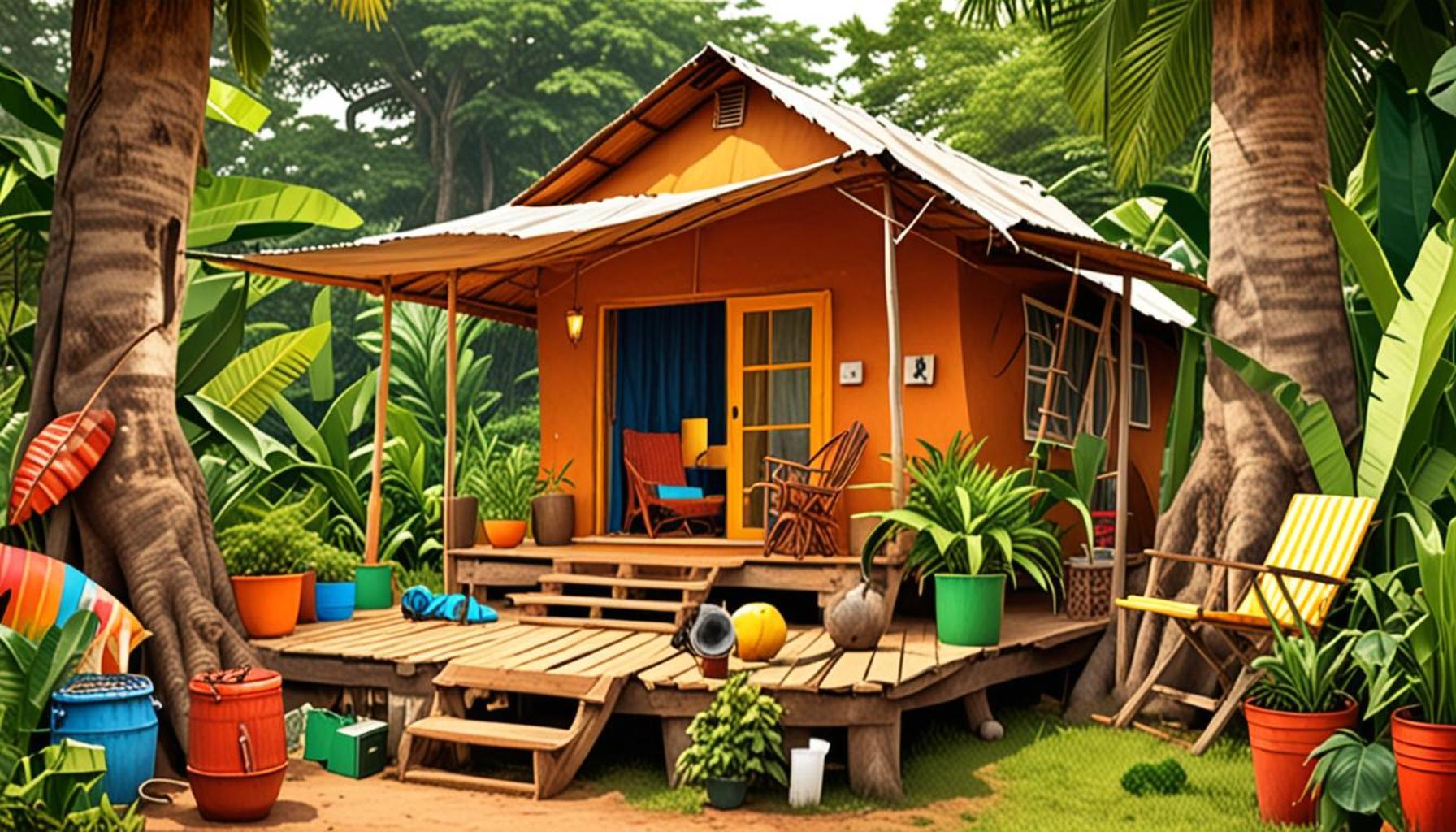Sustainable Accommodations: Where to Stay on Ecological Trips in Nigeria

Discovering Eco-Friendly Stays in Nigeria
As the global community becomes increasingly aware of the environmental challenges we face, the concept of sustainable travel has gained immense traction. Travelers are now searching for accommodations that not only provide comfort but also align with their values of supporting the planet. In Nigeria, a country renowned for its diverse ecosystems ranging from dense rainforests to expansive savannahs, there is a burgeoning array of eco-friendly stays that allow adventurers to engage with nature responsibly while discovering the country’s rich cultural heritage.
When considering eco-friendly accommodations, it is essential to recognize several key aspects that ensure a sustainable experience:
- Environmental Impact: Opt for lodgings that are powered by renewable energy sources, such as solar panels or wind turbines. Many eco-lodges in Nigeria have taken significant steps to integrate green technologies, minimizing their dependence on fossil fuels. Additionally, establishments that implement rigorous waste management practices—like composting and recycling—help reduce their ecological footprint significantly.
- Community Engagement: Look for accommodations that give back to local communities through fair trade and local sourcing of goods. Not only does this practice empower local artisans and farmers, but it also enriches the visitor’s experience by providing authentic cultural interactions. Some eco-resorts collaborate with nearby villages to offer guided tours, allowing guests to learn about traditional crafts and culinary arts while supporting local economies.
- Conservation Efforts: Choose places that actively contribute to wildlife protection and conservation initiatives. Nigeria is home to several national parks, such as Yankari National Park and Gashaka Gumti National Park, where eco-lodges are strategically located. These lodges often participate in conservation projects aimed at protecting endangered species and preserving natural habitats, ensuring that visitors not only enjoy the beauty of the landscape but also contribute to its sustainability.
The variety of eco-friendly accommodations available in Nigeria ranges from serene lodges nestled in the enchanting landscapes of the Mambilla Plateau and Obudu Mountain Resort to charming eco-resorts along the pristine coastline of Lekki. Each of these stays provides a unique opportunity to immerse yourself in the breathtaking natural beauty of Nigeria while adhering to sustainable practices.
By choosing eco-friendly accommodations, your trips can create positive impacts on local environments and communities. This commitment to sustainability not only enhances your travel experience but also fosters a greater understanding and appreciation for the diverse cultures and ecosystems that Nigeria has to offer.
As you plan your next ecological adventure in Nigeria, consider exploring the vibrant eco-friendly accommodations available. These options not only help to leave a minimal footprint but also promise to create lasting memories that will inspire future travels.

CHECK OUT: Click here to explore more
Exploring Eco-Lodges and Their Offerings
Nigeria is a land of breathtaking landscapes and vibrant cultures, with an ever-expanding roster of eco-lodges and green accommodations that cater to environmentally conscious travelers. As more adventure-seekers prioritize sustainability, discerning choices for unique lodging experiences in nature are taking center stage. These eco-friendly stays not only promise comfort but also provide a window into the rich biodiversity of Nigeria.
One hallmark of sustainable accommodations in Nigeria is their commitment to using renewable resources. Many eco-lodges incorporate solar energy, harnessing the abundant sunshine that bathes the nation. For instance, establishments in areas such as the Mambilla Plateau leverage solar panels to power their facilities, reducing reliance on traditional energy sources and minimizing greenhouse gas emissions. Similarly, eco-resorts like Obudu Mountain Resort focus on sustainable infrastructure, providing guests with luxurious experiences without compromising on environmental welfare.
Travelers looking to stay in areas rich in cultural heritage will find that many eco-friendly accommodations incorporate local culture into their offerings. For instance, a visit to eco-lodges in Lekki combines beachside relaxation with the chance to engage in community-driven projects. Here, visitors can enjoy locally sourced meals, crafted by nearby artisans and chefs committed to utilizing fresh, sustainable ingredients. This not only supports local farmers but also enriches the overall dining experience for guests.
In addition, sustainable accommodations often prioritize wildlife conservation. Many eco-lodges near Nigeria’s national parks, such as Yankari National Park, participate in initiatives that aim to protect various endangered species and their natural habitats. Guests at these lodges often have the unique opportunity to participate in guided wildlife tours that elevate the travel experience by fostering a deeper connection to Nigeria’s diverse ecosystems. This immersive engagement benefits both the traveler and conservation efforts in the region.
Here are a few notable eco-friendly accommodations across Nigeria that exemplify the principles of sustainable tourism:
- Mambilla Eco Resort: Nestled in the lush Mambilla Plateau, this eco-resort offers sustainable lodgings built using local materials, providing scenic views of the mountains and valleys.
- Obudu Mountain Resort: Renowned for its natural beauty, this resort integrates green practices while offering a luxurious retreat that harmonizes with the environment.
- Eko Tourist Resort: Located in Lagos, this resort ensures that guests enjoy the pristine coastal ecosystem, featuring eco-friendly structures and a focus on marine conservation.
- Yankari Safari Lodge: Positioned within the heart of Yankari National Park, this lodge promotes wildlife conservation and provides guests with an authentic safari experience.
Choosing to stay at one of Nigeria’s eco-friendly lodgings not only elevates your travel experience but also initiates a ripple effect of positive change within local communities and the environment. These accommodations pave the way for future travel trends, where sustainable practices and cultural immersion go hand in hand, creating a win-win scenario for travelers and the planet alike.
Sustainable Accommodations in Nigeria: A Growing Trend
The quest for eco-friendly lodging options in Nigeria has gained significant momentum as more travelers prioritize sustainable practices during their journeys. With an increasing awareness of environmental issues, the hospitality sector is evolving to meet the needs of eco-conscious guests. These sustainable accommodations not only offer a chance to minimize your ecological footprint but also allow visitors to immerse themselves in the local culture and natural beauty.One facet of these accommodations is their commitment to local sourcing, utilizing materials and services from nearby communities. This approach fosters regional economies, directly benefiting local artisans and farmers. Moreover, many eco-lodges and guesthouses leverage renewable energy sources, such as solar power, to reduce their reliance on fossil fuels. This not only lessens environmental impact but also leads to savings on energy costs for the establishment.Another advantage of choosing sustainable accommodations is the emphasis on biodiversity conservation. Many lodgings are located near natural reserves and parks, contributing a portion of their profits to conservation efforts. For travelers interested in wildlife, staying in these eco-friendly establishments offers access to guided nature tours that highlight local flora and fauna, enriching the overall travel experience.While seeking accommodations, look for places that have received certifications for their sustainable practices. Organizations such as the Global Sustainable Tourism Council (GSTC) provide guidelines to help travelers identify venues that adhere to recognized eco-friendly standards. By opting for these certified establishments, you can enjoy peace of mind knowing that your lodging choice reflects your commitment to responsible tourism.In summary, the rise of sustainable accommodations in Nigeria presents an excellent opportunity for travelers to align their adventures with their environmental values. The synergy between enjoying nature, supporting local communities, and participating in conservation efforts makes eco-friendly lodging a compelling choice for any ecological trip.
| Category | Advantages |
|---|---|
| Eco-friendly Practices | Utilization of renewable resources and local materials. |
| Cultural Immersion | Opportunities to engage with local communities and traditions. |
CHECK OUT: Click here to explore more
Integrating Locally-Sourced Experiences
As travelers increasingly seek authentic and meaningful experiences, many sustainable accommodations in Nigeria integrate locally-sourced materials and practices into their offerings. By doing so, they not only create a unique atmosphere but also significantly contribute to the local economy. Many eco-lodges work hand-in-hand with nearby artisans and craftspeople, thereby fostering a culture of cooperation and mutual benefit.
For instance, Mofor Lodge in Cross River State showcases indigenous architecture and employs local builders to help create its structures, often using materials like bamboo and palm fronds that are abundant in the region. This practice minimizes the carbon footprint typically associated with construction while showcasing the rich cultural heritage of the area. Guests at Mofor Lodge can participate in workshops that teach traditional crafts such as weaving and pottery, connecting them with the local customs and community.
Moreover, dining experiences at these eco-accommodations emphasize the importance of farm-to-table practices. Many lodges source their ingredients from local farmers, ensuring that the meals served are both fresh and sustainable. At the Green Valley Lodge in the foothills of the Obudu Plateau, guests enjoy meals prepared from organically-grown vegetables and spices. The lodge also hosts culinary classes that focus on traditional Nigerian recipes, giving travelers a taste of the region’s culture while promoting local agriculture.
Adventure and Education in Nature
Engaging with nature is at the heart of many eco-lodges, which offer a plethora of activities designed to immerse guests in their surroundings. Sustainable accommodations often organize eco-tours, guided hikes, and river excursions that focus on environmental education and conservation. At Siya Eco Resort, adventure-seekers can embark on guided treks through the lush mangrove forests of Lagos, while learning about the vital role these ecosystems play in combating climate change.
Additionally, many lodges have partnered with local conservation groups to provide guests with volunteer opportunities. Travelers at Kainji Lake Eco Lodge can engage in habitat restoration projects that support local wildlife. This hands-on approach not only contributes to environmental efforts but also allows guests to forge lasting connections with the communities and ecosystems they visit.
- Mofor Lodge: This lodge emphasizes indigenous practices in architecture and collaborates with local artisans to enhance cultural experiences.
- Green Valley Lodge: Known for its farm-to-table dining, this lodge provides culinary classes focusing on local dishes and ingredients sourced from nearby farmers.
- Siya Eco Resort: Guests can participate in eco-tours while learning about the unique ecosystems of the coastal regions, highlighting both adventure and education.
- Kainji Lake Eco Lodge: This lodge offers volunteer opportunities that allow travelers to actively engage in conservation efforts, fostering a deeper connection to nature.
These aspects of sustainable accommodations not only enhance the experience of travelers but also create a framework for a sustainable tourism economy that supports local cultures and the environment. As more visitors seek authenticity alongside a commitment to preserving Nigeria’s natural beauty, eco-lodges will continue to play a pivotal role in shaping the future of travel in the country.
SEE ALSO: Click here to read another article
Concluding Thoughts on Sustainable Accommodations in Nigeria
As the demand for sustainable accommodations grows, Nigeria stands at the forefront of eco-tourism, providing travelers with a rich tapestry of experiences that are both immersive and educational. From the vibrant eco-lodges nestled in the serene landscapes of Cross River to the bamboo structures of Mofor Lodge, and the environmentally-conscious Green Valley Lodge offering fresh, local cuisine, these accommodations showcase the beauty of Nigeria’s natural resources while supporting local economies.
Incorporating a farm-to-table ethos not only enhances the culinary experience but also promotes sustainable agricultural practices—transforming meals into a celebration of local culture and biodiversity. Meanwhile, engaging with the environment through guided hikes and conservation efforts at lodges like Kainji Lake Eco Lodge allows travelers to foster a profound connection with Nigeria’s ecosystems. This hands-on approach empowers guests to contribute positively to conservation initiatives that benefit both nature and communities.
The potential for eco-friendly travel in Nigeria is immense. By choosing sustainable accommodations, travelers ensure that their journeys leave a minimal ecological footprint while providing a lifeline for local traditions and practices. With increasing awareness of the importance of responsible tourism, it is crucial for every traveler to consider their impact. So, whether you’re seeking adventure through eco-tours or desiring a tranquil retreat amidst nature, Nigeria’s eco-lodges are an exemplary choice, weaving together sustainability and authentic cultural experiences. Explore these sustainable gems and become part of a movement that values conservation, community, and the beauty of our planet.


